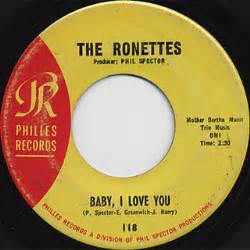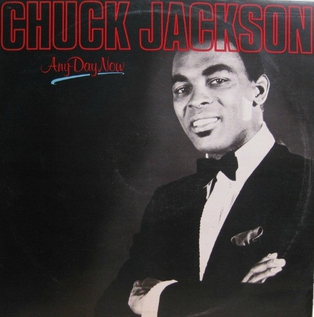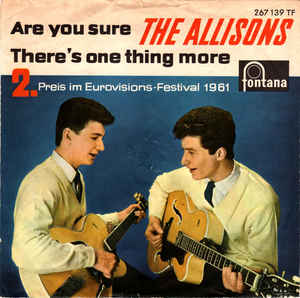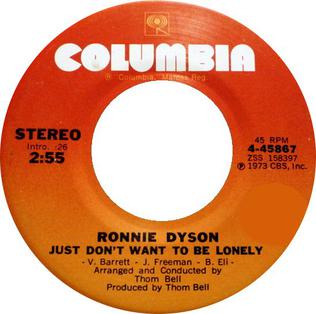"It's Almost Tomorrow" is a 1955 popular song with music by Gene Adkinson and lyrics by Wade Buff. The song was actually written in 1953, when Adkinson and Buff were in high school. Hit versions were released in 1955 by The Dream Weavers, Jo Stafford, David Carroll, and Snooky Lanson.

Ronnie Carroll was a Northern Irish singer, entertainer and political candidate.

"Baby, I Love You" is a song originally recorded by the Ronettes in 1963 and released on their debut album Presenting the Fabulous Ronettes (1964). The song was written by Jeff Barry, Ellie Greenwich, and Phil Spector, and produced by Spector.

"Since I Don't Have You" is a song written and composed by Jackie Taylor, James Beaumont, Janet Vogel, Joseph Rock, Joe Verscharen, Lennie Martin, and Wally Lester. It was first a 1958 hit single for the doo-wop group the Skyliners on the Billboard Hot 100. Country music singer Ronnie Milsap had a hit with the song in 1991. American hard rock band Guns N' Roses also had some success in 1994 with their version of the song which reached the top 10 on the UK Singles Chart.
Leslie David Reed was an English songwriter, arranger, musician and light-orchestra leader. His major songwriting partners were Gordon Mills, Barry Mason, and Geoff Stephens, although he wrote songs with many others such as Roger Greenaway, Roger Cook, Peter Callander, and Johnny Worth.

"Save Your Kisses for Me" was the winning song of the Eurovision Song Contest 1976, performed for the United Kingdom by Brotherhood of Man in The Hague, Netherlands. The lyrics and music were written by Tony Hiller, Lee Sheriden, and Martin Lee, the latter two being members of the band. The song became a worldwide hit, reaching No. 1 in many countries, including the UK, where it became the biggest-selling song of the year. Overall, it remains one of the biggest-selling Eurovision winners ever, and the biggest such seller in the UK.

"It's Only Make Believe" is a song written by drummer Jack Nance and Mississippi-born singer Conway Twitty, while they were touring across Ontario, Canada in 1958. Twitty was a relatively unknown rock n' roll singer at the time, and this song was his first hit, reaching No. 1 on the Billboard chart in November 1958 for two weeks.
"Ruby Baby" is a song written by Jerry Leiber and Mike Stoller. It was originally recorded by the Drifters. Their version was released as a single by Atlantic Records in 1956. It peaked at No. 10 on the US Hot R&B chart.

"Can't Get Used to Losing You" is a song written by Jerome "Doc" Pomus and Mort Shuman, first made popular by Andy Williams in a 1963 record release, which was a number-two hit in both the US and the UK. Twenty years later, British band the Beat took a reggae re-arrangement to number three in the UK.

"Wonderful! Wonderful!" is a popular music song written by Sherman Edwards, with lyrics by Ben Raleigh. The song was first published in 1956. In the United States, a recording by Johnny Mathis reached number 14 on the Billboard charts. It was Mathis' debut single.
"Don't Blame Me" is a popular song with music by Jimmy McHugh and lyrics by Dorothy Fields. The song was part of the 1932 show Clowns in Clover and was published in 1933. Popular versions that year were recorded by: Ethel Waters, Guy Lombardo, and Charles Agnew.

"Roses Are Red (My Love)" is a popular song composed by Al Byron and Paul Evans. It was recorded by Bobby Vinton, backed by Robert Mersey and his Orchestra, in New York City in February 1962, and released in April 1962, and the song was his first hit.

"Any Day Now" is a popular song written by Burt Bacharach and Bob Hilliard in 1962. It has been recorded by numerous artists over the years, including notable versions by Chuck Jackson in 1962, Alan Price in 1965, Elvis Presley in 1969, Scott Walker in 1973 and Ronnie Milsap in 1982. In the lyrics, the singer predicts the imminent demise of a romantic relationship and describes the sadness this will leave.

"Baby I Love You" is a popular song by R&B singer Aretha Franklin. The only single release from her Aretha Arrives album in 1967, the song was a huge hit, peaking at number 4 on the Billboard Hot 100 Singles chart and spending two weeks at number-one on the Hot Rhythm & Blues Singles chart. In the UK, the song rose to number 39 in August 1967, spending four weeks on the chart. It was featured in Martin Scorsese's 1990 film Goodfellas. A live performance appears on the album Aretha in Paris (1968).

"Love of the Common People" is a song written by John Hurley and Ronnie Wilkins, eventually released in 1970 on John Hurley's album John Hurley Sings about People, but first sung in January 1967 by the Four Preps. The Four Preps' recording was not a hit, but, later in 1967, the Everly Brothers and Wayne Newton would each issue their versions of the song, both of which "bubbled under" in the US charts; Newton's version peaked at No. 106, the Everlys' at No. 114. However, the Everly Brothers' recording was a major hit in Canada, peaking at No. 4. In 1968, Irish artist Joe Dolan and backing grouping the Drifters recorded a version which hit the top 10 on the Irish Singles Chart, but did not chart elsewhere.
Francis Edward Ifield OAM is an Australian country music singer and guitarist who often incorporated yodelling into his music. After living in Australia, Ifield returned to the United Kingdom in November 1959 where he had four number-one hits on the UK Singles Chart in the early 1960s with his cover versions of "I Remember You", "Lovesick Blues", "The Wayward Wind" and "Confessin' That I Love You".

"Are You Sure?" is a song by British pop duo The Allisons, that represented the United Kingdom at the Eurovision Song Contest 1961, performed in English.
"Ring-A-Ding Girl" was the British entry to the Eurovision Song Contest 1962, performed in English by Ronnie Carroll.

"Just Don't Want to Be Lonely" is a song written by Bobby Eli, John Freeman and Vinnie Barrett, originally recorded in 1973 by Ronnie Dyson and popularized internationally by The Main Ingredient. Dyson's version reached No. 60 in the US Pop chart, No. 30 Adult Contemporary, and No. 29 in the US R&B chart. Its flipside was "Point of No Return", a song written by Thom Bell & Linda Creed.

Unforgettable – A Musical Tribute to Nat King Cole is a soundtrack album released in the UK in 1983 by the CBS Records division of Columbia in conjunction with the broadcast of American pop singer Johnny Mathis's BBC television concert special of the same name that featured Cole's daughter Natalie. The front of the original album jacket credits the concert performers as "Johnny Mathis and Natalie Cole", whereas the CD booklet reads, "Johnny Mathis with special guest Natalie Cole".













